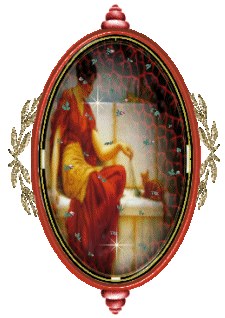|


The Wedding

In D.H. Lawrence's short
story, The Fox:
"She looked up at
him with tears running from her eyes, a senseless look of helplessness and
submission. She would never leave him again. He had won
her. And he knew it and was glad, because he wanted her for his
life. His life must have her. And now he had won her. It
was what his life must have.
But though she belonged
to him, though she lived in his shadow, as if she could not be away from
him, she was not happy. She did not want to leave him: and yet
she did not feel free with him. . . He had won her, he had her with him,
she was his wife. And she - she belonged to him, she knew it. But
she was not glad. And he was still foiled. He realized that
though he was married to her and possessed her in every possible way,
apparently, and though she wanted him to possess her, she wanted it, she
wanted nothing else, now, still he did not quite succeed.
Something was
missing. Instead of her soul swaying with the new life, it seemed to
droop, to bleed, as if it were wounded."

It is a fact that the institution of
Marriage
was adopted by the Church and State to sanctify the family and raise the
standards of our culture respectively. The State did not want to
assume the burden of caring and providing for illegitimate children born
out of wedlock. The Church declared it was a couple's moral
obligation and duty to assume all responsibility of children born from the
copulation of two individuals. Nature played her part too. She
cleverly enticed the young to believe their hormone explosion was a sign
of falling in love - not sex -
love. And so many of our youth become trapped in a marriage with all
kinds of commitment before they even know what has happened.
Painfully, they must face their fragile illusions about love and
life.
Often, the real love comes later -
but this is where the grief begins. People are legally married,
already have children, are entrapped in financial obligations, and
committed to jobs and a lifestyle very few are content with.
While our school systems presently
educate our very young (10-16) about the birds and the bees, offer sex
counseling, and free condoms as a buffer for becoming infected with HIV -
the statistics inform us nothing is really changing. While people
are still marrying - they are also divorcing. So much for the
percentage that are trying to play it straight. Conversely, there is
still a large percentage of alternative or unconventional life
styles that people assume which often promote disease, addiction, and
poverty. One of the saddest reflection of this segment of society
are the unwed mothers who give birth to babies they cannot keep.
The pain, the disillusionment, the
hardships . . . still do not seem to be the powerful lessons we
might think they are to discourage these scenarios from
perpetuating. Why is this so? Perhaps it is mainly an awareness issue -
and then once obtaining this awareness - a discipline.


|
|
Do we still cherish the
same romantic illusions as did our grandparents and parents:
respect, commitment, honor, unconditional love. Do you think love
will last forever? How do young adults feel about love and the
commitment of marriage?
Sex Without Love
Sharon Olds (1942)
How do they do it, the
ones who make love without love? Beautiful as dancers, gliding over
each other like ice-skaters over the ice, fingers hooked inside each
other's bodies, faces red as steak, wine wet as the children at birth
whose mothers are going to give them away. How do they come to
the . . . come to the . . . God . . . come to the still
waters, and not love the one who came there with them, light rising slowly
as steam off their joined skin? These are the true religious, the
purists, the pros, the ones who will not accept a false Messiah, love the
priest instead of the God. They do not mistake the lover for their
own pleasure, they are like great runners: they know they are alone
with the road surface, the cold, the wind, the fit of their shoes, their
over-all cardiovascular health - just factors, like the partner in the
bed, and not the truth, which is the single body alone in the universe
against its own best time.
The Greeks
understood the different phases of love. They put love at the very
core of ethics while most modern theories relegate it to the margins or
ignore it altogether. The ancient Greeks distinguished:
Eros: This
word is the root of our word, "erotic." It means sexual
desire or attraction. Plato, and much, much later, Sigmund Freud, claimed
that eros
is the motivation behind many more of our choices and actions than we
usually recognize. Eros
is the most closely related of these three types of love to what we
usually mean by "romantic" or "erotic" love.
Philia: forms
part of the root of our words, "philosophy" and "philanthropy."
It refers to love within groups of intimate associates and generally means
"friendship." Aristotle insisted that "no man would
choose to live without friends," and he meant by "friend" a
person with whom one had a long- lasting, fulfilling relationship full of
high regard. The "philosopher" is the "friend of
wisdom", a person who cares for wisdom and wants to live his or her
life sharing in it.
Agape: What
we would now call "brotherly love." It is the kind of love
that one can and possibly does feel for everyone, or for the whole world -
for "thy neighbor," in general. If "God is
Love," as the Biblical claim goes, then He is agape love.
Focusing on the theme of Love
and happier relationships - are there solutions? Possibly. We look to
our religious educators and professionals for help. We
are hopeful that education will give young
people a different perspective of life, love, and responsibility before
they have experienced too many disappointments resulting in a great deal
of bitterness and baggage for the next (if there is one)
relationship. Knowledge, experience, and responsibility comprise a powerful package towards
getting people on the right track.
Astrology and the
Horoscope
I would strongly advocate that young
people be educated before getting married. Mandatory Psychology
and Astrology courses would be most beneficial.
The astrological chart based on
empiric information, shows the psychological dynamics within each person's
psyche. Before becoming involved with another, it is very important
to know and understand yourself, your strengths, weaknesses, talents,
capacity for love, sexual drive, etc. The chart is also able
to determine and describe the parents' marriage and how much he/she was affected
by the family dynamics. Was the childhood positive or negative
- nurturing or disruptive? This will determine how much unresolved baggage
a person brings into his/her own relationship. I do not think young people would be so eager
to jump into a sexual or marriage commitment if made aware of all the
complications and issues that must first be resolved individually.
While I do not maintain
that Astrology or Psychology have all the answers that will insure
happy, productive "forever" relationships, I strongly believe, as an
Astrologer, that the horoscope
is the truest and most reliable tool
we have today (bar none) for giving tremendous insight into a
person's psyche and behavior as well as the ability to compare the energies of two people to
determine if they are compatible. In addition, it will suggest if a person
is ready or suited to make a commitment. Since life is a learning experience,
as we mature, we become more aware and usually our requirements are
different from those of more youthful days. Most important, we
cannot really love another until we accept and love ourselves - a lifetime
endeavor.

|